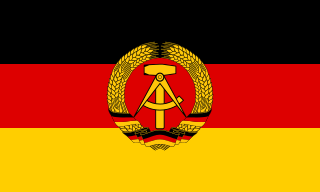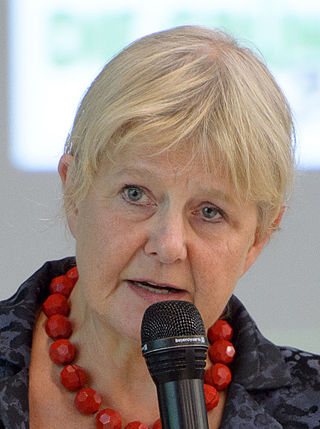
East Germany, officially known as the German Democratic Republic, was a country in Central Europe from its formation on 7 October 1949 until its reunification with West Germany on 3 October 1990. Until 1989, it was generally viewed as a communist state and described itself as a socialist "workers' and peasants' state". The economy of this country was centrally planned and state-owned. Although the GDR had to pay substantial war reparations to the Soviets, it became the most successful economy in the Eastern Bloc.

The Party of Democratic Socialism was a left-wing populist political party in Germany active between 1989 and 2007. It was the legal successor to the communist Socialist Unity Party of Germany (SED), which ruled the German Democratic Republic as the de facto sole legal party until 1990. From 1990 through to 2005, the PDS had been seen as the left-wing "party of the East". While it achieved minimal support in western Germany, it regularly won 15% to 25% of the vote in the eastern new states of Germany, entering coalition governments with the Social Democratic Party of Germany in the federal states of Mecklenburg-Vorpommern and Berlin.

The Social Democratic Party of Germany is a centre-left social democratic political party in Germany. It is one of the major parties of contemporary Germany.

The Socialist Unity Party of Germany was the founding and ruling party of the German Democratic Republic from the country's foundation in 1949 until its dissolution after the Peaceful Revolution in 1989. It was a Marxist–Leninist communist party, established in 1946 as a merger of the East German branches of the Communist Party of Germany and Social Democratic Party of Germany.

Hans Modrow was a German politician best known as the last communist premier of East Germany.

The Christian Democratic Union of Germany was an East German political party founded in 1945. It was part of the National Front with the Socialist Unity Party of Germany (SED) and a bloc party until 1989.
The National Front of the German Democratic Republic was officially an alliance of parties and mass organisations (1950–1990). In fact, only one party held power in the GDR, namely the communist SED. The National Front was an instrument to exercise control over the other parties and organisations. The precursor of the National Front was the Democratic Bloc.

The Peaceful Revolution, as a part of the Revolutions of 1989, was the process of sociopolitical change that led to the opening of East Germany's borders with the West, the end of the ruling of the Socialist Unity Party of Germany (SED) in the German Democratic Republic in 1989 and the transition to a parliamentary democracy, which later enabled the reunification of Germany in October 1990. This happened through non-violent initiatives and demonstrations. This period of change is referred to in German as Die Wende.
The Sozialistische Deutsche Studentenbund — the Socialist German Students' Union or Socialist German Students' League — was founded in 1946 in Hamburg, Germany, as the collegiate branch of the Social Democratic Party of Germany (SPD). In the 1950s, tensions between the SDS and the main party surfaced, particularly over the party's support of West Germany's rearming, until the SPD expelled all members of the SDS from the party in 1961.
Neues Deutschland is a left-wing German daily newspaper, headquartered in Berlin.

Republikflucht was the colloquial term in the German Democratic Republic for illegal emigration to West Germany, West Berlin, and non-Warsaw Pact countries; the official term was Ungesetzlicher Grenzübertritt. Republikflucht applied to both the 3.5 million Germans who migrated legally from the Soviet occupation zone and East Germany before the Berlin Wall was built on 13 August 1961, and the thousands who migrated illegally across the Iron Curtain until 23 December 1989. It has been estimated that 30,000 people left the GDR per year between 1984 and 1988, and up to 300,000 per year before the construction of the Berlin Wall in 1961.

The German Democratic Republic (GDR), German: Deutsche Demokratische Republik (DDR), often known in English as East Germany, existed from 1949 to 1990. It covered the area of the present-day German states of Mecklenburg-Vorpommern, Brandenburg, Berlin, Sachsen, Sachsen-Anhalt, and Thüringen. This area was occupied by the Soviet Union at the end of World War II excluding the former eastern lands annexed by Poland and the Soviet Union, with the remaining German territory to the west occupied by the British, American, and French armies. Following the economic and political unification of the three western occupation zones under a single administration and the establishment of the Federal Republic of Germany in May 1949, the German Democratic Republic was founded on 7 October 1949 as a sovereign nation.

The Left, commonly referred to as the Left Party, is a democratic socialist political party in Germany. The party was founded in 2007 as the result of the merger of the Party of Democratic Socialism (PDS) and Labour and Social Justice – The Electoral Alternative. Through the PDS, the party is the direct descendant of the Marxist–Leninist ruling party of former East Germany, that being the Socialist Unity Party of Germany (SED). Since 2022, The Left's co-chairpersons have been Janine Wissler and Martin Schirdewan. The party holds 28 seats out of 736 in the Bundestag, the federal legislature of Germany, having won 4.9% of votes cast in the 2021 German federal election. Its parliamentary group is the smallest of six in the Bundestag, and is headed by parliamentary co-leaders Heidi Reichinnek and Sören Pellmann.

The Social Democratic Party in the GDR was a reconstituted Social Democratic Party existing during the final phase of East Germany. Slightly less than a year after its creation it merged with its West German counterpart ahead of German reunification.

General elections were held in East Germany on 18 March 1990, and were the first and only free elections held in the state before German reunification. The Alliance for Germany, led by the new East German branch of the right-wing Christian Democratic Union (CDU), won 192 seats and emerged as the largest bloc in the 400-seat Volkskammer, having run on a platform of speedy reunification with West Germany. The East German branch of the Social Democratic Party (SPD), which had been dissolved in 1946 and refounded only six months before the elections, finished second with 88 seats despite being widely expected to win. The former Socialist Unity Party of Germany, restyled as the Party of Democratic Socialism (PDS), finished third with 66 seats the first free election in which it participated.

Vera Lengsfeld is a German politician. She was a prominent civil rights activist in East Germany and after the German reunification she first represented the Alliance 90/The Greens and then the German Christian Democratic Union (CDU) in the Bundestag.

Marianne Birthler is a German human rights advocate and politician of the Alliance '90/The Greens. From 2000 to 2011, she served as the Federal Commissioner for the Stasi Records, responsible for investigating the past crimes of the Stasi, the former communist secret police of East Germany. In 2016 she was offered the nomination of the CDU/CSU and her own party for President of Germany, but after some time decided not to run; the parties would have had a majority in the Federal Convention, securing her the election.

Joachim Wilhelm Gauck is a German politician who served as President of Germany from 2012 to 2017. A former Lutheran pastor, he came to prominence as an anti-communist civil rights activist in East Germany.
Jutta Braband is a former German politician. In the German Democratic Republic she was a civil rights activist who after 1990 became a PDS member of the Germany parliament (Bundestag). Her parliamentary career ended in May 1992 after it had become known that fifteen years earlier she had worked for the Ministry for State Security (Stasi) as a registered informant .
Thomas Klein is a German civil rights activist, historian, and politician.















